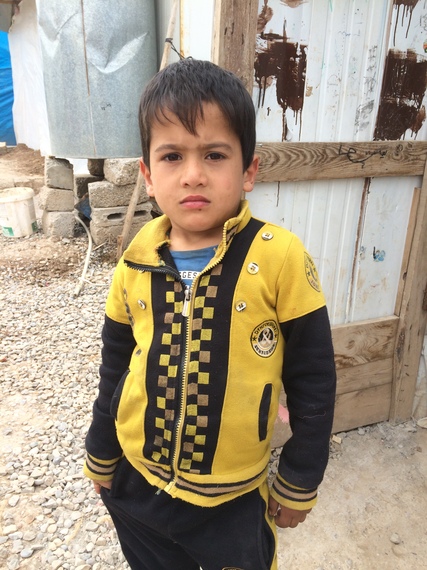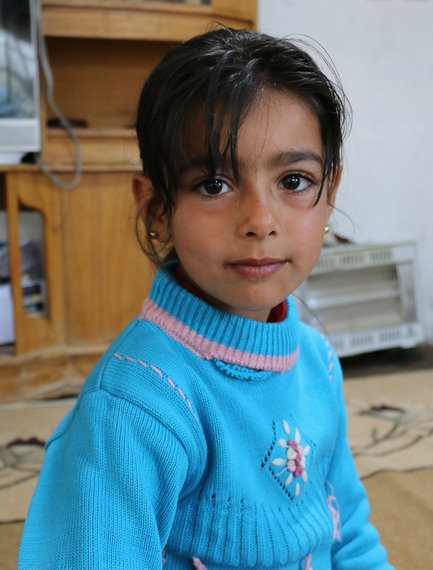This week, marking the fifth anniversary of the Syria crisis, UNHCR staff in Iraq met families with five year old children who were born at the start of the Syrian conflict, to hear about the challenges they've faced and their hopes for the future.
Five year old Bila Ghassan Rosol - Gawilan refugee Camp By Catherine Robinson, UNHCR On a sunny, spring afternoon 5-year old Bila Rosol plays happily inside her two-room cement home in the Gawilan refugee camp in northwestern Iraq. She laughs along with her two younger brothers as they amuse themselves with their toys, which are spread across the floor of their small living space. This is how she and her siblings spend their days, happily unaware of the life they were forced to leave in Syria two years ago.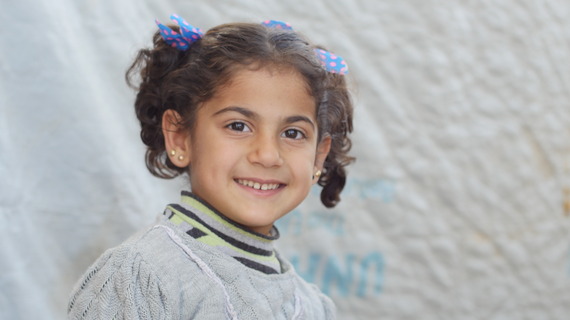
Her father, 34 year old Ghassan, says he made the decision to move his family to Iraq when the situation in Damascus became too dangerous for them to stay. "We were enjoying our life in Damascus, I was working as an electrician and life was good for us," he recalled.
Last year his brother was killed by a sniper in Syria. "I am glad we left", said Ghassan. "My family is safe here and I have found work with the camp management."
In addition to her brothers, Bilal has three special girlfriends to play with. She is still too young to go to school, but attends kindergarten at a Child Friendly Space where she sings, plays music and is learning the English alphabet.
When her father mentions that Bilal wants to be a teacher when she grows up, the little girl nods her head and smiles. He says, "My hope is that we can return home and live happily in Syria and that all my children will receive a good education."
Five year old Mirfat Dalil - Domiz refugee Camp By Catherine Robinson, UNHCR
5-year old Mirfat Dalil stands out among a group of boys playing on a dusty street in the Domiz refugee camp in northwestern Iraq. Dressed in a bright pink and white sweater, she watches intently as they roll, toss and flick their marbles back and forth, playing for keeps.
The youngsters play in front of a small grocery store owned by Mirfat's grandfather, 59-year old Ali Hussein. When Mirfat was born in Damascus, Ali says he became her caregiver and she views him as her father. Her parents have recently relocated to another part of the camp, but Mirfat spends her days with him.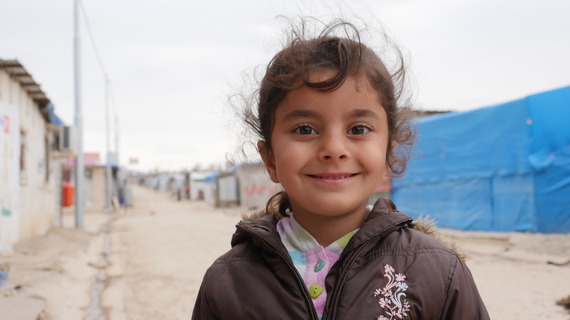
Her grandfather, Ali, said when they first moved to Domiz in 2012, the camp was small and it was easy for Mirfat to walk to a Child Friendly Space by herself. "The camp has grown so large, Mirfat gets lost walking to the center now. Her parents are busy working and I have to stay at my shop, so she stays with me and is happy playing with dolls with her girlfriends," he said.
Mirfat has two younger siblings, who were born at the camp. Her grandfather said his large and extended family inside the camp have no plans to leave. "Life is not predictable anymore. If the war in Syria ends, we will not return. We are Kurds and we want to stay here in Iraq, where we are safe and can stay together."
And his hope for his granddaughter? "I hope she goes to school and studies to get a degree. I would like to see her become a doctor or engineer.""Our lives have turned upside down" - Mohammed, aged five, Baghdad By Caroline Gluck, UNHCR Mohammed, aged five, is a very serious child. As I speak to his parents, he solemly watches, barely a flicker of emotion showing on his young face.
Despite his young age, he has been through more turmoil than many experience during an entire lifetime. His family escaped conflict, fleeing from their home in Deir ez-Zor, in Syria, in August 2012, when a rocket demolished the family home. They fled with just the clothes they were wearing and carrying their passports.
Mohammed's father, Abdul Khaliq, had been home for a holiday from his well-paid job in the United Arab Emirates, where he ran his own interior décor company and employed twelve staff.
But they became caught up in their country's conflict like millions of others, and ended up having to flee Syria, crossing into Iraq and ending up at Al Qaim, in Anbar governorate where they stayed at a refugee camp run by UNHCR. However, that was just the start of their journey and more displacement followed. Barely a year later, the family were forced to move one more time as extremist forces took over the area, this time ending up on the outskirts of Ramadi.
Once again, about a year later, the family were forced to go on the move because of heavy fighting. Little Mohammed was critically injured with shrapnel in his stomach and underwent a life-saving operation in hospital. With no let-up in the fighting, the family were taken by ambulance across Bzeibiz bridge ending up in Baghdad, where his Iraqi-born mother, Sonia, had some relatives.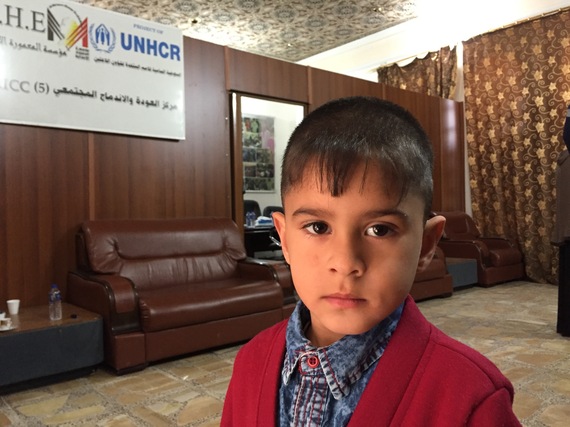 Photo: Five year-old Mohammed, UNHCR/C Gluck
Photo: Five year-old Mohammed, UNHCR/C Gluck
"The last five years have been incredibly difficult", said Mohammed's father, Abdul Khaliq. "Our lives have turned upside down. It's a 180 degree difference. I used to have my own company and employ staff; now, I sometimes manage to get work as a day labourer. I struggle to pay the rent and can't get proper employment as we don't have the official documents that allow me to do that.
"I can't afford things for my children, I can't provide for all my family's needs. Before, we had everything. Now, we have nothing. I feel dead, powerless", he said.
Mohammed has never been to school and would love to attend kindergarten. His older brother, Layth, aged seven, has only spent one month in school when the family lived in Ramadi. But ongoing insecurity in Baghdad has made the family fearful. While their mother, Sonia, said she would love her sons to attend school, she is worried about their safety and makes them stay at home.
Despite everything the family has gone through, however, they still have hope for the future. "We pray for our country to be free of violence and to return to Deir ez-Zor", said Abdul. "We hope the next five years will be better. Our lives changed from one hour to the next. Maybe the same will happen again - but for the better."
His wife, Sonia, gently patting her third son, Hamza, just one and a half year's old, on the back, agreed. "I just want my children to be safe and have everything they need. I want them to get an education. I hope things will improve. With God's help, I hope so".
As the family prepare to leave, Layth tells me how much he enjoyed school and playing with other children. These days, he can only play with his younger brother - and says Mohammed is good at hiding.
A wonderful smile breaks out on Mohammed's face. It makes me fervently hope that, despite everything the family has endured, there will be better times ahead.
Five year old Ali Mohammed - Domiz refugee Camp By Catherine Robinson, UNHCR
As a group of young boys put a kite together on a windy day in Domiz refugee camp, in Dohuk province, northern Iraq, five year-old Ali Mohammed stands across the street watching, too shy to join in. His mother sits on a chair with neighbors, watching the children play and Ali cuddles in close to her as they watch the kite take flight.
40-year old Layla says she and her family, including her husband and three children, made the decision to leave Damascus in 2013, when a mortar fell in front of their house and she was slightly injured. "We came to Kurdistan because we are Kurdish. It was the closest place and we feel very safe now," she adds.
Her husband is one of many men in the camp who have left for Europe, in search of a better life for his family. He is in Germany, waiting for his documents, so Layla, Ali and his two siblings can join him.
"I would like Ali to be able to live in a safe and secure place, away from war", says Layla. "I want my children to live, and most of all to have a good education."Aiya, 5, Bainjan town, Sulaymaniyah, N.Iraq
UNHCR's Aryan Hamawande talked to one Syrian refugee family who were formerly living in Al Qamishli in Syria, but moved to Bainjan town in Sulaymaniyah Governorate, northern Iraq in 2012 as the conflict worsened. One of their children, a daughter, Aiya, turned five years old this week.
"Aiya was born on 17 March 2011 two days after protests started in my country", recalled father of three, Muhammed Salih Muhammed, who was living in the Syrian city of Homs at the time with his family. "But at that time I felt so complete with my family on the farm. I had a very good landlord and his daughter is the same age as Aiya. Her name was Yara; they were inseparable, best friends since birth. Aiya is full of hope and energy. She loves to sing and act and is not shy at all. Her mother and I were always saying she will be a great actor or a singer someday.
"Then when the war got closer to Homs, my wife and I started feeling scared and worried. One day when I was coming back home I was stopped at the checkpoint by some armed gunmen. They asked me a lot of questions. When they found out I'm Kurdish they slapped me in front of my wife and children. I was so ashamed. That moment I felt like I was not man enough to defend for myself and my family.
So my family and I returned to Al-Qamishli, because it was still calm at that time; we did not want to go because Aiya was very attached to her friend Yara. I will never forget my daughter's tears when we said goodbye to that Yara's family.
"In Al-Qamshli, I worked as a sweets-maker (making candy); the kids loved my job because they had a lot of sweets to eat. But the war reached my hometown after 6 months and we felt we had to leave again fearing for our lives. We thought Kurdistan would be best because at least the Kurds would let us in and treat us well.
"My wife was pregnant with my youngest daughter, Maya, then and it was so difficult to travel. "I remember the day we arrived in Sulaymaniyah. It was 12 December 2012. We got registered with UNHCR and they came to visit us and distributed core relief items and kitchen materials. Then other agencies like STEP, REACH Iraq and CDO [non-governmental agencies] came to help us with food and other assistance.
"The landlord here let us live rent free if we agree to construct and extend the house. I am so grateful for the local support we receive. The local people here helped us on the first night bringing us clothes and blankets to keep us warm because it was so cold in December.
"I found a job at an iron factory near our house in Bainjan and I was earning enough for my family (approximately USD 600/month). But due to my health I had to stop working a few months ago. But it's okay. We have some family who supports sometimes. We owe the local grocer lots of debt because he allowed us to buy food on credit.
"Now my son, Walid, is going to the nearby school. He likes it and Aiya is in kindergarten. They're making new friends and have become familiar with their new neighbourhood. "My wife and I have a lot of hope for my children. Aiya wants to be a teacher or a singer. I want them to finish school and send them to college. We hope they do better than us; I don't want them to have my life or go through what my wife and I had to face fleeing our country.
"I want to see them being able to speak English well and tell their stories to the world about what Syrian children had to face during war time.
" Maybe in 5 years time, the war will end in Syria and we can go back home. Maybe my daughter Aiya will be able to play again with her best friend Yara."
"Our life is on hold"- 5 year old Mohammed, Qushtapa refugee camp, northern Iraq By Caroline Gluck, UNHCR Five year-old Syrian refugee, Mohammed is playing in the front yard with his young sister, Jaylan, aged just three. It is one of the neatest self-built brick houses in the refugee camp that I've visited. The tiny patio is lovingly designed with pretty plants and mint. Inside, there are toys decorating a room where the family spend most of their time. The family arrived at the camp when it first opened in August 2013. "The armed conflict came closer and closer to us", said Mohammed's father, 29 year old Amer Hawaz Kheno. He was afraid that he would soon be forcibly conscripted - either by the army or an extremist group - and decided to leave the family home in Damascus, where they stayed with his parents. "We had a family house which felt like heaven. I try to make this here as much like home as we can", he said. His wife, Sherine, remembers better times back home. "Life was so much better than here. The environment now is difficult. There is not much greenery or clean air and the children get sick a lot", she said. She dreams of a brighter future. "I want my children to finish their studies and be something in life. I insist on that. Both my husband and I didn't finish school in Syria and face challenges because we are not well-educated. My children will both go to school and I hope they have an easier life". Mohammed has started going to kindergarten. He says his favourite subjects are religious studies and maths, and says he wants to become an engineer when he grows up.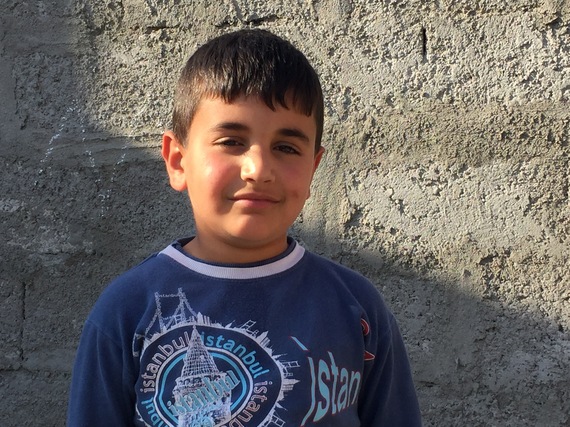 Photo: Mohammed, aged five, UNHCR/C Gluck His father, Amer, used to paint houses in Syria. He managed to get labouring work when the family first moved to Qushtapa, but said it has dried up "I haven't had any work in the last four months", he said. "The economy is very bad and I am borrowing money from my brothers to support my family. As for the future, Amer says he cannot see the family remaining in the camp for five more years. He has tried to leave several times for Europe, but said smugglers are demanding high fees that he cannot pay. "It's too high risk!", said his wife, saying she is frightened at the prospect of her family embarking on a perilous journey. "Yes, its not the right way", conceded Amer, "but we have little other choice. "I just feel we are waiting. Our life is like a watch that has stopped. It's not working now! Our lives are on hold"
Photo: Mohammed, aged five, UNHCR/C Gluck His father, Amer, used to paint houses in Syria. He managed to get labouring work when the family first moved to Qushtapa, but said it has dried up "I haven't had any work in the last four months", he said. "The economy is very bad and I am borrowing money from my brothers to support my family. As for the future, Amer says he cannot see the family remaining in the camp for five more years. He has tried to leave several times for Europe, but said smugglers are demanding high fees that he cannot pay. "It's too high risk!", said his wife, saying she is frightened at the prospect of her family embarking on a perilous journey. "Yes, its not the right way", conceded Amer, "but we have little other choice. "I just feel we are waiting. Our life is like a watch that has stopped. It's not working now! Our lives are on hold"
For updates, follow us on Facebook: https://www.facebook.com/UNHCRinIraqand Twitter @UNHCRIraq

